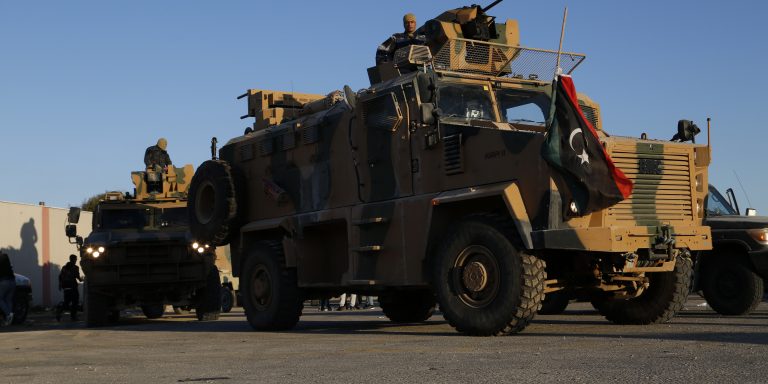INTELBRIEF
June 29, 2022
IntelBrief: Renewed Threat of Violence in Libya Adds to Global Energy Market Stress

Bottom Line up Front
- A power struggle between eastern and western-based rival governments has brought Libya to the brink of renewed civil war.
- U.N. mediators have failed, thus far, to persuade contending factions to agree to a process for national elections.
- Armed clashes in Tripoli demonstrate that supporters of the rival administrations are willing to use force to produce favorable political outcomes, even if doing so harms the civilian population and economy.
- The infighting briefly reduced Libya’s oil production by 90%, adding to the stress in global oil markets induced by Russia’s invasion of Ukraine.
U.N. mediators have been trying for nearly two years to reconcile contending factions and prevent a return to an all-out conflict for control of Libya, but their efforts appear to be faltering. A week of U.N.-led talks in Cairo between the rival governments in Libya’s east and west – represented by the Tripoli-based High State Council and the eastern-based House of Representatives (HoR, parliament) – ended on June 20 without an agreement on a constitutional electoral process for a president and a parliament. The rivals appear unwilling to compromise on election rules and other mechanisms necessary for a vote, although many experts assess that the two leaders are reluctant to forfeit their offices in favor of a unified transitional governing body. In the absence of a deal, Libyan leaders interpret the mediation mandate of the United Nations Support Mission in Libya (UNSMIL) to have expired on June 22, but the United Nations, U.S, and European leaders argue that the expiration date does not apply because it was contingent on the holding of elections – which were planned for December 2021 but called off. Reflecting that view, Stephanie Williams, the U.N. Secretary-General's Special Adviser on Libya convened a meeting yesterday, between the two factions at the U.N. office in Geneva. Having the two leaders present to discuss the constitutional framework for elections is a positive step, however, it’s difficult to be optimistic about the outcome of the two-day summit.
The breakdown of the Cairo talks came amid an acceleration of clashes in Tripoli between armed militias supporting each camp - raising the specter of a return to full-scale civil war and offering no relief to the Libyan population, more than 10 years after the overthrow of the dictator Muammar al-Qadhafi. On June 10, heavy exchanges of gunfire and explosions erupted in several districts of Tripoli, while local press images showed civilians fleeing heavily-trafficked areas. The fighting was in part triggered by the eastern government’s decision to name Fathi Bashagha prime minister. Bashagha was forced to flee Tripoli as a result of the violent response his appointment and arrival in the city elicited from rival groups. Despite his return to Sirte, the unrest in Tripoli has yet to subside.
More violence erupted on June 22, when competing security forces clashed in Tripoli, killing one fighter and damaging property. A civilian was also killed in a traffic collision as he and others fled the area of the clash. A June 24 joint statement by the United States, France, Germany, Italy, and the United Kingdom expressed Western leaders’ concerns that Libya is regressing to renewed civil conflict: “We firmly reject actions that could lead to violence or to greater divisions in Libya, such as the creation of parallel institutions, any attempt to seize power through force, or refusal of peaceful transition of power to a new executive formed through a legitimate and transparent process...We continue to expect the full implementation of the 23 October 2020 ceasefire agreement.” Yet, currently, there are no indications that eastern-based commander Khalifa Haftar, who has been backed by the United Arab Emirates (UAE) and Russia, has mobilized his fighters in the Libyan National Army for a renewed push to capture Tripoli by force. His effort to do so in 2019 failed, in large part because of military support from Turkey to the U.N.-backed government in Tripoli.
Although statements by Western leaders highlighted the need for a political settlement to the dispute, their moral concerns are underpinned, now more than ever, by an economic interest in Libyan energy exports. The United States and Europe are wrestling with a spike in energy prices, reflecting Western sanctions on Russia for invading Ukraine, and Russia’s reduction of gas supplies to several European countries as retaliation for arming Ukraine. The United States and its allies have hoped that a Libya reconciliation deal would enable the country’s exports of both crude oil and gas to increase, helping the global energy markets compensate for reductions in Russian supplies. Although it is a member of OPEC, Libya has been exempted from production quotas due to the ongoing instability. The power struggle - including protests and armed attacks targeting Libyan oil and gas installations - caused Libya’s daily oil production to plummet in early June from its average of 1.2 million barrels to just over 100,000 barrels per day. The decline came as protesters forced workers to shut down the key export terminals in the Gulf of Sirte. The country’s output had already halved to 600,000 barrels a day in mid-April after armed groups closed the major Sharara and El Feel fields. The drastic decline in oil revenue appears to have caught the attention of the rival leaders, as they have moved to rein in attacks on key infrastructure in recent days. Libyan energy officials stated on June 24 that production had recovered somewhat, to about 800,000 barrels per day, although as recently as Monday, they have warned that continued violence may force temporary export interruptions. The prospects appear dim for Libyan political reconciliation, as well as the country’s ability to help global energy markets handle the fallout from the war in Ukraine, but U.N. mediators and their Western backers are committed to keeping the rival factions talking rather than fighting.